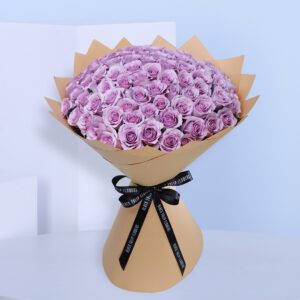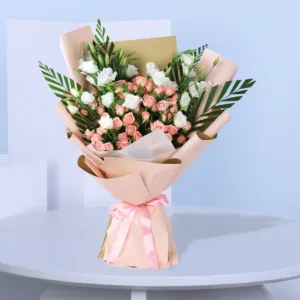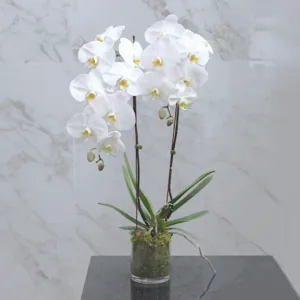
Why Are Flowers Important to Humans, and the Environment
Flowers have attracted people for centuries because they are beautiful, fragrant, and make us feel good. Research shows that flowers greatly affect our emotions and overall well-being. Surrounding ourselves with flowers can boost mood and reduce stress, especially during challenging times, and there is a lot of work from home even after COVID. This highlights why flowers are important to humans.
Flowers are important in our lives. They add colour and variety to our surroundings and are essential for plant reproduction. Flowers attract pollinators and help plants produce and protect seeds to ensure that plants can grow in the future. Sending flowers allows us to express our feelings, which can improve the emotional well-being of the recipients. Research shows a strong link between nature and happiness, which highlights how important flowers are for a happy and fulfilling life.
Why Are Flowers Important for Us Emotionally?
Research supports the idea that being around flowers can really boost our mood. Studies show that spending time in nature, including with flowers, has health benefits, such as a lower risk of heart disease and better mental health.
How Do Flowers Reduce Stress & Anxiety?
- Flowers can increase positive brain chemicals—oxytocin, serotonin, and dopamine—which help us feel relaxed, happy, and connected. A study from Rutgers University found that people who received flowers felt happier right away, and this feeling lasted for days.
- Professor Loretta Graziano Breuning notes that flowers instantly evoke positive emotions in our brains. She explains that flowers trigger dopamine, a reward signal linked to abundance after winter.
- Flowers can stimulate oxytocin, the “bonding hormone” related to feelings of safety and connection, and during significant life moments like childbirth and breastfeeding. It is interesting, isn’t it?
- Flowers can release serotonin, the “happiness hormone,” like chocolate. Thus, growing, buying, gifting, or simply admiring flowers can enhance our well-being.
The Science Behind Why Flowers Smell So Good
Have you ever enjoyed the fragrance of a bouquet or wandered through a flower-filled meadow? Floral scents can uplift your mood because our olfactory nerve is directly connected to the brain’s limbic system, which governs emotions and memories. Pleasant smells can trigger joyful memories, helping to reset our minds
How does Scent affect mood?
Scents significantly impact our emotions and can energize us. The olfactory system processes smells and sends signals to the brain, while the limbic system links these scents to past emotions, allowing us to intentionally influence our moods with fragrances.
The scents of flowers like lavender and roses can lower stress by reducing cortisol levels. Nature offers many flowers known to enhance mood: Lavender alleviates anxiety, Roses evoke happiness, Jasmine promotes relaxation, and Chrysanthemums can brighten your spirits even more than chocolate.
Flowers Strengthen Social Connections
Flowers help strengthen friendships, relationships, and connections at work. They encourage kindness and compassion, and their beauty and scent create positive feelings. This leads to more substantial and more memorable relationships.
Flowers Help You to Sleep Better
Sleep and mental health are connected, with flowers enhancing wellness. Lavender aids in sleep through aromatherapy, while jasmine boosts alertness and reduces restlessness. Both contribute to overall well-being.
Non-Verbal Communication
Choosing birthday flowers is super easy. All you ought to do is to know the flower of the month, and you can simply buy them. For example, you can give Carnations to January born.
Anniversaries are significant occasions. If you want to surprise your partner, consider a bunch of Roses for deep love and Orchids for elegance.
Flowers for Important Different Occasions
| Occasion | Flowers | Meaning |
|---|---|---|
| First Date | Sunflowers, Daisies | symbolize love and dedication, while daisies represent new beginnings and purity. |
| Confessing Love | Red Roses | symbolize passion and deep emotions, making them perfect for romantic gestures. |
| Meeting Parents | Lilies, Hydrangeas | Lilies symbolize respect and commitment, while hydrangeas represent gratitude and understanding. |
| Engagement | Tulips, Peonies | Tulips reflect love and happiness, while peonies symbolize prosperity and good fortune. |
| Wedding Day | Roses, Orchids, Calla Lilies | White roses represent new beginnings, orchids symbolize love and strength, and calla lilies exude elegance. |
| Anniversary | Carnations, Lilies | Carnations signify love and gratitude, while lilies symbolize commitment and enduring love. |
| Birth of a Child | Pink Roses, Daisies | Pink roses convey joy and adoration, while daisies symbolize innocence and fresh starts. |
| Retirement | Sunflowers, Lavender | Sunflowers bring happiness and longevity, while lavender represents |
Which flower is the most uplifting?
While having any flowers at home feels lovely and uplifting, some are proven to work a little bit harder than others.
Having flowers at home can be uplifting, but some work particularly well for boosting mood.
- Roses: Known for their endorphin-boosting qualities, studies show pink roses can promote relaxation and happiness.
- Peonies: Peonies are cherished for their ability to brighten people’s days
- Sunflowers: These bold, beautiful flowers are perfect for lifting your mood, bringing brightness and smiles reminiscent of sunny days.
The colors of flowers can significantly affect our emotions. Leatrice Eiseman from the Pantone Colour Institute notes that our response to color is deeply emotional, making flowers catalysts for various feelings. For instance, red symbolizes love and passion while also providing energy and upliftment, similar to yellow. In contrast, colors like blue and white promote calmness.
Why Are Flowers Important to the Environment?
Flowers are important for the environment in several ways:
1. Pollination and Biodiversity
Flowers attract pollinators such as bees, butterflies, and birds. These pollinators help plants reproduce. This reproduction is important for producing food and keeping different species alive.
2. Air Purification
Flowers like lilies and chrysanthemums purify the air by filtering toxins and improving air quality both indoors and outdoors.
3. Soil and Water Conservation
Flowers play a vital role in maintaining soil health by preventing erosion and supporting beneficial microbial populations. Additionally, they contribute to water management by absorbing excess rainwater, which helps reduce the risk of flooding.
Bottom Line
In today’s fast-paced world, sending or receiving flowers can boost happiness and well-being. Online flower delivery services and local shops in Qatar make it easy to spread joy. Flowers provide emotional comfort, support pollinators, and enhance biodiversity. Their vibrant colours and therapeutic effects significantly impact our well-being. Whether decorating your home, cultivating a garden, or gifting blooms, flowers elevate our spirits and spread positivity.
Why are flowers important (FAQ)
1. Why flowers are important to human beings?
Flowers make us feel better emotionally and psychologically. They lift our mood, reduce stress, and help us connect with others. Flowers also benefit the environment by cleaning the air, helping with pollination, and supporting biodiversity. Appreciating the multifaceted value of flowers enriches our understanding of their impact on individuals and the ecosystem.
2. Why are flowers so beautiful?
Flowers come in many beautiful colours and patterns, and they smell wonderful, too. Over time, they’ve evolved to attract bees and other pollinators.
3. Why do flowers make people happier?
Research shows that flowers can boost dopamine and serotonin levels, which are linked to happiness and relaxation. Adding flowers to our environment may create a calmer, more uplifting space.
4. How do flowers affect our emotions?
Flowers can instantly uplift mood, reduce stress, and promote feelings of love and gratitude. Different colours of flowers also influence emotional responses, with warm tones energizing and cool tones calming the mind.
5. What are the best flowers for improving mood?
Sunflowers, roses, and peonies are among the best flowers for boosting happiness and relaxation due to their bright colours and symbolic meanings.
6. Why do flowers have different colors?
Flowers have evolved with vibrant colours to attract specific pollinators. These colors also impact human emotions, with bright flowers energizing and pastel hues promoting calmness.




